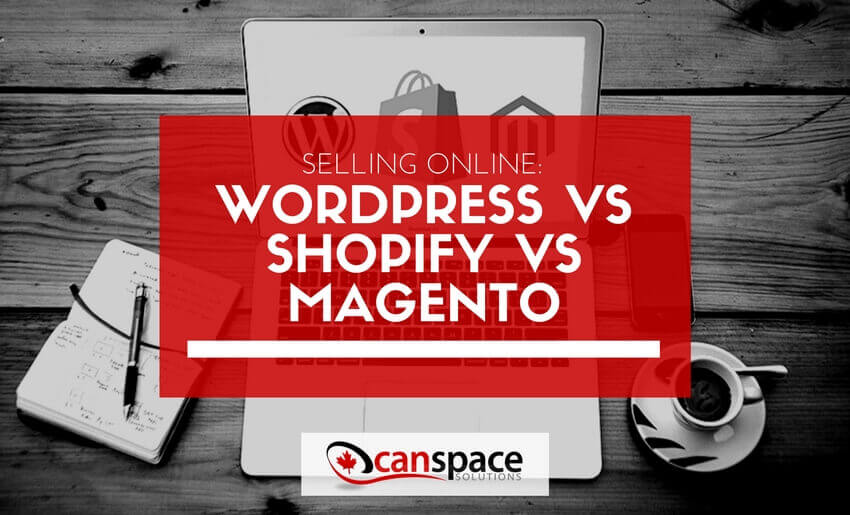If you’ve ever wanted to get your own store up and move into eCommerce, you may have wondered what the difference is between WordPress, Shopify and Magento.
All three are used to build online stores. So which one should you use and why?
That’s the topic we want to cover in this article. We’ll touch on the pros and cons of each platform – and when they’d each make sense for you to use.
Selling Online With WordPress
As you may already know, WordPress is basically the king when it comes to building websites. In the case of eCommerce, it’s no different.
The biggest and most scalable solution for WP is called WooCommerce. A plug-in that allows you to build your entire online store on WordPress.
Within the plug-in you have options for managing your inventory, customizing your product line-up and assigning SKU’s at the click of a button.
All of this means you can relatively quickly build out your product line; even if you’re doing something like clothing and have hundreds of SKU’s for different sizing, colors etc.
WordPress Pros
1. Scalable and flexible platform
WordPress is one of the most popular website building applications. The platform is easy to use and learn, which means WordPress developers typically come at a lower cost than other higher-level developers.
They simply have to use a plug-in like WooCommerce to build upon your website and craft out your store. This ease of access passes a time and cost savings down to you.
2. Extendible functionality
WooCommerce has a very large library of extensions. There are more than 450 to choose from, allowing you to build functionality like coupons, email marketing and more into your store.
Some are free, while others are premium/paid options.
This extendibility gives the freedom to “make the site your own” and grow into more diverse marketing and sales opportunities.
3. Free to use
While there are of course premium extensions you can purchase, WooCommerce is completely free to use.
This is great as beginners can set up their store and begin selling risk free. No need to worry about monthly payments right out of the gates (like Shopify. More on this below).
WordPress Cons
1. WooCommerce can be expensive
While it is free to use, adding premium extensions onto your store for additional functionality can get pricy.
Some of the extensions cost upwards of $150. A large upfront investment you do not have when using Shopify. This is a trade-off as Shopify does come with a monthly fee.
Selling Online With Shopify
If you’re not familiar with Shopify – they are a standalone eCommerce platform.
Once again you have all the tools to set up your own store, start selling and processing payments. They also have a marketplace of “plug-ins” you can use to build functionality into your site.
Shopify Pros
1. Strong integrations built for commerce
Shopify is built for business owners of all kinds. Not only do they have the platform for online purchases. They also have tools to help you integrate into the offline world.
If you have a retail location, you can utilize Shopify’s POS system to help centralize your transaction management and order processing (good for organization and accounting).
This can also help you better define and manage your customer rewards programs and discount offers.
Shopify Cons
1. Monthly fee(s)
Shopify’s cheapest plan is $29 per month, and goes all the way up to $299. There are a huge variety of free plug-ins to choose from. However, many are paid as well.
The difference is most plug-ins are a monthly fee, versus WooCommerce which gives you a flat rate. On the plus side, Shopify offers a 2 week free trial so you can test them out before paying.
2. Weaker SEO
As WordPress has a large emphasis on its utility for bloggers, they have much better SEO features than Shopify.
If you are planning to blog, you may want to keep this in mind. You could however set-up a WordPress blog and link it to your Shopify store if you wanted to.
WordPress vs Shopify
Now that you have a basis of comparison, how do you decide between WordPress and Shopify?
You may want to start by asking yourself the following questions.
- What platform do you feel most comfortable with?
- Would you prefer monthly payments or one-time fees?
- Do you do business offline or have plans to?
- Do you plan on making content marketing a major strategy?
If you are planning to only sell online, prefer a free platform to start, and want to focus on content, you might be best off with WordPress.
If you want to integrate your business online and offline into one system, and prefer something that “does it all” right out of the box, you might be best off with Shopify.
Now, how do you decide if you should go with Magento?
If WordPress seems like the better solution for you, pick WordPress. However, if you are interested in the Shopify system, you will gain value from seeing how it compares to Magento as it is another complete commerce solution.
Selling Online with Magento
If you like Shopify, but feel a little constrained by what you see available in their marketplace, or think you may outgrow the software, Magento may be for you.
They specialize in more “enterprise solutions” for the commerce world. See: Magento homepage. A few clients they mention right away are Burger King, Coca Cola, and Christian Louboutin.
Magento Pros
1. Built to scale
As Magento is an enterprise solution, they’ve built their software to help large companies scale up their product offerings and increase their traffic with as little friction as possible.
2. Seamless integration to the offline world
Magento takes the Shopify commerce system to the next level. If you’re looking for a strong “omnichannel” solution – this is basically THE only option.
They help you no matter where, when or how you sell.
3. Good community of “partners”
The software is a bit complicated (as we’ll touch on below), but there is a strong community of data-driven web specialists to help you build your website.
This can help you build your store with conversion optimization.
Magento Cons
1. Complicated software
The learning curve is much bigger here than the one you’d have with WordPress or Shopify. This means a bigger up-front time investment to get situated.
2. Costly development
Given that it is more of an enterprise solution with more complex software – the Magento developer skillset is more specialised. For you, this means the development cost when hiring will be markedly higher than Shopify or WP.
Shopify vs Magento
For the typical small business owner, Magento is going to be a big headache to try and get your store online and running smoothly. By comparison Shopify makes setting your store up as quick as a couple hours.
In Conclusion
For most business owners trying to build their store online, the decision is going to be between WordPress and Shopify. Use the information here to determine your needs and decide on a platform.
If you decide to use WordPress, remember that you’re going to need a domain and hosting. Check out our web hosting packages to get started.
CanSpace is Canada’s leading domain name registrar and web hosting provider. Let us help you launch your store! Our support team is on call 24 hours a day, 365 days a year to help with any questions or needs you have.












